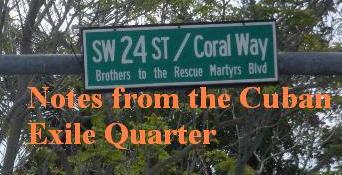Hope versus despair in a totalitarian context
The past year has been a tough one for friends of a free Cuba. There have been great losses: the academic, Juan Clark, the comedian, Guillermo Alvarez Guedes, the former chairman of Bacardi, Manuel Jorge Cutillas, the Christian Democrat and intellectual, José Ignacio Rasco, the human rights defender Martha Frayde, and now the former prisoner of conscience Antonio Augusto Villarreal Acosta. The majority of these Cubans died of natural causes, but two stand out: Juan Clark and Antonio Augusto Villarreal Acosta. Both apparently committed suicide. Cuba shares a dubious distinction with Uruguay as having the highest suicide rates in the Western Hemisphere.
The Czech dissident Vaclav Havel in his 1986 book "Disturbing the Peace" offers an existentialist analysis of suicide that is in conflict with Catholic teaching:
Within the Cuban context, a society where totalitarianism has permeated every corner of existence (including familial relationships), despair is one of the few resources in great "abundance" in Cuba. This leads to the obvious question: How does one confront despair?
Christians can appeal to God and faith, but what about agnostics and atheists? Vaclav Havel in a later essay "Never Hope Against Hope" offered a powerful definition and reflection on hope:
In the meantime my prayers go out to these dear departed and especially to Juan Clark and Antonio Augusto Villarreal Acosta.
"Eternal rest grant unto them, O Lord, and let perpetual light shine upon them. May the souls of the faithful departed, through the mercy of God, rest in peace. Amen."
 |
| Juan Clark, PhD. and Antonio Augusto Villarreal Acosta |
The past year has been a tough one for friends of a free Cuba. There have been great losses: the academic, Juan Clark, the comedian, Guillermo Alvarez Guedes, the former chairman of Bacardi, Manuel Jorge Cutillas, the Christian Democrat and intellectual, José Ignacio Rasco, the human rights defender Martha Frayde, and now the former prisoner of conscience Antonio Augusto Villarreal Acosta. The majority of these Cubans died of natural causes, but two stand out: Juan Clark and Antonio Augusto Villarreal Acosta. Both apparently committed suicide. Cuba shares a dubious distinction with Uruguay as having the highest suicide rates in the Western Hemisphere.
The Czech dissident Vaclav Havel in his 1986 book "Disturbing the Peace" offers an existentialist analysis of suicide that is in conflict with Catholic teaching:
I have never been able to condemn suicides; instead, I tend to respect them, not only for the undoubted courage needed to commit suicide, but also because suicides place the value of life very high: they think that life is too precious a thing to permit its devaluation by living pointlessly, emptily, without meaning, without love, without hope. Sometimes I wonder if suicides aren't in fact sad guardians of the meaning of life.The Church teaches that suicide is a grave sin that violates the fifth of the ten commandments: "You shall not kill." However it does qualify that "Grave psychological disturbances, anguish, or grave fear of hardship, suffering, or torture can diminish the responsibility of the one committing suicide." Finally it states that:
"We should not despair of the eternal salvation of persons who have taken their own lives. By ways known to him alone, God can provide the opportunity for salutary repentance. The Church prays for persons who have taken their own lives."Psychologists have reported that there is an inner voice that drives a person to suicide and offer therapies on how to combat it. One cannot dismiss this as simply the result of a mental disorder, but rather a combination of factors. Hopelessness in combination with depression or other disorders can lead to suicide. Other studies have demonstrated a specific relationship between suicide and hopelessness otherwise known as despair.
Within the Cuban context, a society where totalitarianism has permeated every corner of existence (including familial relationships), despair is one of the few resources in great "abundance" in Cuba. This leads to the obvious question: How does one confront despair?
Christians can appeal to God and faith, but what about agnostics and atheists? Vaclav Havel in a later essay "Never Hope Against Hope" offered a powerful definition and reflection on hope:
The kind of hope I often think about (especially in hopeless situations like prison or the sewer) is, I believe, a state of mind, not a state of the world. Either we have hope within us or we don't. Hope is not a prognostication — it's an orientation of the spirit. Each of us must find real, fundamental hope within himself. You can't delegate that to anyone else.Havel here reaches far back into antiquity and offers a meditation on hope that the Stoics would have embraced. Hope as defined here by Havel is internal not external and offers those confronted with hopelessness with the tools to battle that inner voice of despair with the power of living with conviction in truth. In the case of Cuba where the secret police is out to destroy you in body and spirit such tools are a necessary part of physical and spiritual survival.
Hope in this deep and powerful sense is not the same as joy when things are going well, or willingness to invest in enterprises that are obviously headed for early success, but rather an ability to work for something to succeed. Hope is definitely not the same thing as optimism. It's not the conviction that something will turn out well, but the certainty that something makes sense, regardless of how it turns out.
In the meantime my prayers go out to these dear departed and especially to Juan Clark and Antonio Augusto Villarreal Acosta.
"Eternal rest grant unto them, O Lord, and let perpetual light shine upon them. May the souls of the faithful departed, through the mercy of God, rest in peace. Amen."





No comments:
Post a Comment